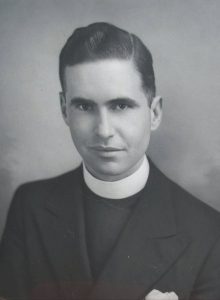 A story in the pulpit
A story in the pulpit
The first “farmer” story just happened. My father found himself telling it in the pulpit of his first parish one Sunday morning. It just came out in the middle of a traditional, three-point, expository sermon, the kind that he’d learned in seminary.
Dad always loved a good story, especially a humorous one, and he told one he’d heard from one of the farmers in the congregation. It was something about prayer and farming and it got a laugh.
It wasn’t a big laugh and people looked at each other to make sure it was OK to laugh. No preacher they could recall ever told a story like that in the middle of the sermon. At the end of the service several people told him they liked the story. It was during the next week that he noticed something interesting.
Many of the people he visited during the week mentioned the story. They remembered the story and they remembered the point. That had never happened before. He already had his sermon planned for the next Sunday, but Dad decided to try out another story in his sermon the following Sunday.
A natural experiment in the effect of a story
People might not remember the finely reasoned points from his sermons. But they usually remembered his stories and often they remembered the point of the story. So little stories about farm and village life became part of my father’s sermons. The only people who didn’t seem to like the stories were other pastors.
One evening a pair of older pastors from nearby churches came by to counsel him. They had heard that he was telling jokes from the pulpit. He assured them he was not. But he was telling stories, they said, and that wasn’t good. It wasn’t serious and it took up time when he could be making important points.
When the other pastors left, my father was troubled, but my mother set things right. She pointed out that Jesus told stories all the time. That was all Dad needed to hear. Stories were part of his sermons for the rest of his life. He didn’t know why they worked, but they worked for Jesus and they worked for him. It’s only recently that we’ve found out why.
Modern research into why stories are so powerful
Psychologist Gary Klein’s research suggests that stories work better that exposition as a teaching tool because they illustrate causal relationships. Stories work the way we think: linking cause and effect.
Other research has used brain scans to observe what happens in the brain when we read or listen to a PowerPoint presentation and a story. Expository presentations make the point and share data to support it, but they only light up the language processing parts of the brain. Stories are different.
Well-told stories light up parts of the brain that actual experience lights up. That’s what put’s the horror in horror movies. We don’t just hear stories, we experience them. We don’t just think about stories, we experience them.
In Chip Heath’s “Making Ideas Stick” class, he has students give speeches about crime patterns in the US. Here’s how Heath describes the speeches.
“In the average one-minute speech, the typical student uses 2.5 statistics. Only one student in ten tells a story.”
The speeches are good and the best speakers get the best evaluations from their classmates. Just like those bingo-card evaluation forms for professional speakers. But wait, there’s more.
Heath plays a ten-minute film, like a Monty Python clip, to distract the students. Then he tests them on what they remember from the speeches. It’s usually not much. Here’s how Heath describes what happens.
“When students are asked to recall the speeches, 63 percent remember the stories. Only 5 percent remember any individual statistic. Furthermore, almost no correlation emerges between ‘speaking talent’ and the ability to make ideas stick.”
And the best speakers? The ones whose content people remembered? Here’s Heath again.
“The stars of stickiness are the students who made their case by telling stories, or by tapping into emotion, or by stressing a single point rather than ten.”
My Dad knew about that. Now you do, too.
Note: The description of Chip Heath’s class and the quotes are from the book Made to Stick by Chip and Dan Heath.